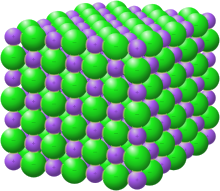Samarium monosulfide

| |
| Identifiers | |
|---|---|
3D model (JSmol)
|
|
| |
| |
| Properties | |
| SSm | |
| Molar mass | 182.42 g·mol−1 |
| Appearance | dark brown crystals |
| Melting point | 1,940 °C (3,520 °F; 2,210 K) |
| Structure | |
| cubic | |
| Related compounds | |
Other cations
|
Neodymium sulfide |
Except where otherwise noted, data are given for materials in their standard state (at 25 °C [77 °F], 100 kPa).
| |
Samarium monosulfide is a binary inorganic chemical compound of samarium metal and sulfur with the chemical formula SmS.[1]
Synthesis
[edit]Fusion of stoichiometric amounts of pure substances:
- Sm + S → SmS
Physical properties
[edit]Samarium monosulfide forms crystals of cubic system, spatial group Fm3m, cell parameters a = 0.5970–0.5863 nm, Z = 4, structurally isomorphic with NaCl.[2]
The compound melts congruently at a temperature of 1500 °C, 1940 °C, or 2080 °C.[3]
SmS is a chalcogenide material that exists in two possible states: as a metal (also called "golden") and as a semiconductor ("blue" or "black").[4] As a result, SmS has gained considerable interest as a switchable material.[5]
Uses
[edit]Samarium monosulfide has a high sensitivity to deformation. Therefore, SmS is a promising material for creating pressure sensors of force, torque, accelerations, etc.[6]
References
[edit]- ^ Comprehensive Inorganic Chemistry II: From Elements to Applications. Newnes. 23 July 2013. p. 537. ISBN 978-0-08-096529-1. Retrieved 25 July 2024.
- ^ Okamoto, H. (1 December 2010). "S-Sm (Sulfur-Samarium)". Journal of Phase Equilibria and Diffusion. 31 (6): 577. doi:10.1007/s11669-010-9790-9. ISSN 1863-7345. Retrieved 25 July 2024.
- ^ Predel, B. (1998). "S-Sm (Sulfur-Samarium)". Pu-Re – Zn-Zr. Landolt-Börnstein - Group IV Physical Chemistry. 5 J: 1–2. doi:10.1007/10551312_2657. ISBN 3-540-61742-6. Retrieved 25 July 2024.
- ^ Volchkov, Ivan; Baskakov, Evgeniy; Strelov, Vladimir; Kanevskii, Vladimir (1 November 2022). "Thermoelectric and electrical characteristics of SmS ceramic samples after exposure to a pulsed magnetic field". Journal of Rare Earths. 40 (11): 1778–1784. Bibcode:2022JREar..40.1778V. doi:10.1016/j.jre.2022.01.008. ISSN 1002-0721. Retrieved 25 July 2024.
- ^ Sousanis, Andreas; Smet, Philippe F.; Poelman, Dirk (16 August 2017). "Samarium Monosulfide (SmS): Reviewing Properties and Applications". Materials. 10 (8): 953. Bibcode:2017Mate...10..953S. doi:10.3390/ma10080953. ISSN 1996-1944. PMC 5578319. PMID 28813006.
- ^ BOLSHEV, K. N. (2014). "Application of barorezistor from samarium monosulfide when carrying out heatphysical experiments" (PDF). ВЕСТНИК МАХ (3). Retrieved 26 July 2024.
